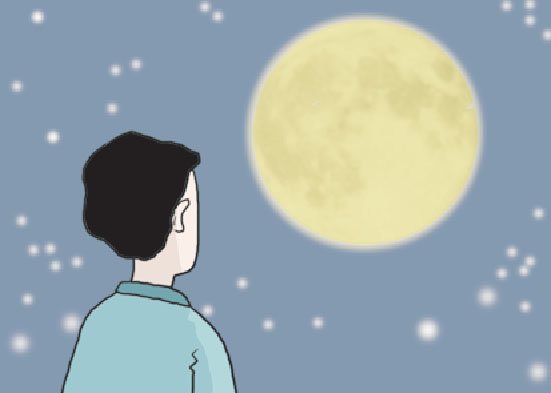The comfort of the moon
The comfort of the moon
Posted January. 09, 2019 07:31,
Updated January. 09, 2019 07:31

There was a time when songs about moon comforted us. The first Korean children’s song "Half Moon," which was announced in 1924 did so. The moon where "a cinnamon tree and a rabbit" lived was a dugout canoe that traveled the vast sea without a mast or a pole. Without the intent of songwriter Yoon Geuk-yeong, who made the song with sorrow when hearing the news of his married eldest sister’s death, many people were comforted by this song. People used to this song by comparing it to the sorrow of losing their country during the Japanese colonial rule and sought comfort with this song during historical crises since independence.
Although the context is different, the moon of the British rock band Pink Floyd also comforted us. "Brain Damage," which was included in its 1973 album "Dard Side of the Moon," especially did so. “And if your head explodes with dark forbodings too. I’ll see you on the dark side of the moon...And if the cloud bursts, thunder in your ear. You shout and no one seems to hear. I’ll see you on the dark side of the moon.”
“The dark side of the moon,” used by Pink Floyd, was a metaphor that demonstrates the dark emotion or impulse of human. This song was a song of comfort as "I" can truly understand "you," who suffer from dark feelings and impulse because "I" am also like you.
The moon had been a myth and metaphor to us. It was a dugout canoe where a cinnamon tree and a rabbit lived, and the dark side of human nature. Like always, however, the scientific civilization by all means breaks such myth and metaphor. The Apollo 11 moon landing of 1969 shattered the myth of the cinnamon tree and rabbit delivered by the poet 50 years ago and China's Chang'e-4 spacecraft, which landed on the far side of the moon, broke the metaphor of dark human nature delivered by Pink Floyd. The myth of the rabbit is only left in the name of a robot (gem rabbit) that investigates the far side of the moon. Metaphors and myths have been broken by science. While we call it development, we've become poorer by losing metaphors and myths. What will be the end of such poverty?




![[속보]이스라엘 “이란 공격” 국가비상사태 선포…테헤란 폭발음](https://dimg.donga.com/c/138/175/90/1/wps/NEWS/IMAGE/2026/02/28/133440981.1.gif)


